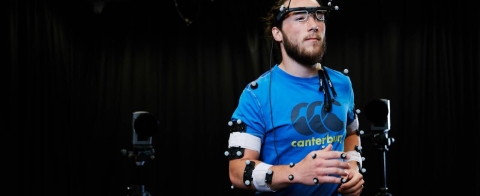
Our internationally-recognised research in Culture, Behaviour, Inclusivity and Governance, reflects our expertise across scientific disciplines – including psychology, sports management, skill acquisition, and biomechanics.
We inform multidisciplinary research across a wide spectrum of domains, ranging from community to high-performance sport. Throughout our research, we draw upon an array of fundamental and applied science approaches, including innovative social science methodologies, laboratory techniques, and longitudinal interventions. From this, we can provide novel insights tailored towards performance enhancement and psychosocial development through sport.
Our research proactively promotes an open research culture, with staff in the theme representing the University of Portsmouth as local network lead in the UK Reproducibility Network community.
Our research covers the following topics:
-
Cultural, Organisational and Performance Psychology
Our research in this area has been instrumental in implementing global changes to the education, training, and delivery of sport and exercise psychologists in performance contexts. This work has led to improved support underpinning both the performance and wellbeing of a range of stakeholders in high-performance domains.
Our research also explores the culturally diverse methods and mechanisms through which safe sport contexts may be developed in order to support the development of systems that promote individuals' mental well-being and their ability to thrive on pressure.
-
Skill and Human Movement
This research sub-group has developed current understanding of behaviour, human skill, and the control of movement across the lifespan, working across varying performance domains from elite sport to health and safety practice.
Our research has adopted novel multidisciplinary methods, including the integration of mobile eye tracking and motion capture technologies, biomechanical measures, and stress and anxiety manipulations.
A focus of our work is centred on performance enhancement of perceptual-motor skill and movement patterns through training interventions, including but not limited to, skill acquisition, biofeedback, strength and conditioning, and performance analysis practices.

-
Inclusivity and Governance
The Inclusivity and Governance sub-group brings together world-leading multidisciplinary researchers, building a knowledge-base to inform work with underrepresented and marginalised populations across a wide spectrum of sport, health and exercise science settings.
Research in this sub-group addresses socio-cultural issues through sport and physical activity, working with youth and understanding disability, impairment, within sport, health and exercise settings.
This subgroup also has a focus on contemporary topics in sports governance including women in sport, global considerations in sport management education, and duty of care and safeguarding of youth.
If you have any queries about the Culture, Behaviour, Inclusivity, and Governance in sport theme, please contact the research theme lead, Dr Matt Miller-Dicks (matt.miller-dicks@port.ac.uk)
Discover our areas of expertise
Individual, occupational and organisational performance is one area of expertise in the Psychology, Sport and Health Sciences research area – explore the others below.

Physical Activity, Health and Rehabilitation
We're investigating ways to increase physical activity, how to rehabilitate individuals from conditions that prevent them from being active, and exploring the positive benefits of physical activity in a variety of clinical and non-clinical contexts.
Interested in a PhD in Sport and Exercise Science?
Browse our postgraduate research degrees – including PhDs and MPhils – at our Sport and Exercise Science postgraduate research degrees page.
